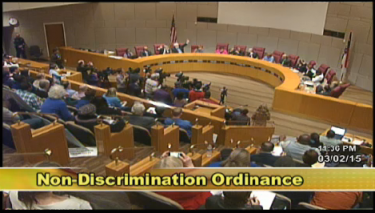
Following four hours of public comment and an additional hour of committee discussion, the Charlotte City Council defeated a proposal by one vote that would have expanded a number of city ordinances to include legal protections on the basis of “sexual orientation,” “gender identity,” and “gender expression.”
The 6-5 vote came after an amendment was adopted to exclude restrooms, locker rooms, showers and changing facilities from the “public accommodations” that would have been covered by the measure.
Ultimately, council members John Autry, Michael Barnes, Edmund Driggs, LaWana Mayfield, Gregory Phipps, and Kenny Smith voted against the proposal. It appeared that Barnes, Driggs, Phipps and Smith opposed the original proposal altogether, while Autry and Mayfield voted against it because they did not agree with removing restrooms, locker rooms, showers and changing facilities from the expanded ordinance plan.
More than 60 percent of the 100-plus individuals who participated in the public comment period spoke in opposition to the proposal and they asked the City Council to do the same.
The North Carolina Family Policy Council, NC Family Action, NC Values Coalition, and a number of other organizations, joined local churches and individuals to educate citizens in Charlotte about the harms that would result from the proposal, and Charlotte responded!
Concerns about the Charlotte “SOGI” ordinance proposal ( “Sexual Orientation” and “Gender Identity”):
- It would allow a man to go into a women’s restroom, locker room, or shower room, and would allow a woman to go into a men’s restroom, locker room, or shower room, depending upon the individual’s “sexual orientation,” “gender identity,” or “gender expression,” and not their biological sex. This ordinance would apply to any “public accommodation,” including hotels, motels, restaurants, schools, day care centers, museums, libraries, parks, amusement parks, pools, gyms, theaters, stadiums, convention centers, retail businesses, shopping malls, etc. The City of Charlotte defines “public accommodation” as, ” a business, accommodation, refreshment, entertainment, recreation, or transportation facility of any kind, whether licensed or not, whose goods, services, facilities, privileges, advantages or accommodations are extended, offered, sold or otherwise made available to the public.”
- It would require small business owners – especially those related to the wedding industry – to potentially violate their religious beliefs about marriage or face legal action by the government. Similar “anti-discrimination ordinances” in other states have forced florists, photographers, bakers, bed-and-breakfast owners, and others to decide between violating their sincerely held religious beliefs about sexuality and marriage or paying severe penalties and even facing the closure of their business.
- It would authorize the Charlotte-Mecklenburg Community Relations Committee, or any “aggrieved person,” to file an action in State Superior Court and seek monetary damages and other penalties against an individual or business for allegedly violating this amended ordinance. According to the “enforcement/relief” section of the policy, “The court may grant as relief, as it deems appropriate, any permanent or temporary injunction, temporary restraining order, or other order, and may award to the plaintiff actual damages, including compensation for humiliation and embarrassment, and punitive damages, together with court costs and reasonable attorney’s fees in the case of a prevailing plaintiff.”
- It would make Charlotte the first city in the state to adopt a hazardous “public accommodation” ordinance creating legal protections on the basis of an individual’s “sexual orientation,” “general identity,” or “gender expression” as they determine it at any given time. This would place the constitutionally protected privacy rights of women, men and children at great risk, and it would put the constitutionally protected religious liberties of small business owners and others at stake.
